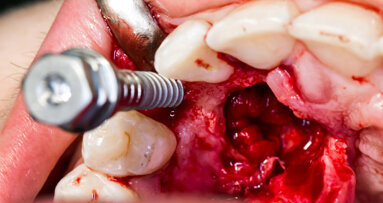LONDON, UK: The latest government figures estimate that one in ten people in the UK suffer from dental anxiety. New research from King’s College London involving pretreatment use of cognitive behavioural therapy (CBT) has shown that the method is largely effective in helping patients overcome their fear of treatment.
In a study involving patients suffering from high levels of dental phobia, the researchers found that the overall majority were able to undergo treatment without sedation after having undergone therapy at the Dental Institute Health Psychology Service at Guy’s and St Thomas’ NHS Foundation Trust. Only six per cent of the patients surveyed had to be treated with sedation.
“Our study shows that after on average five CBT sessions, most people can go on to be treated by the dentist without the need to be sedated,” said Tim Newton, lead author and Professor of Psychology as Applied to Dentistry.
A short-term therapy, CBT has been shown to help with depression and a number of anxiety-related disorders, such as obsessive–compulsive disorder and bulimia. Typically, over six to ten sessions, a therapist aims to help patients change their feelings and behaviours by restructuring their thinking and breaking negative thought cycles. According to the researchers, the most common anxiety-inducing factors in the study were identified as drilling and having an injection.
Newton recommended that, despite the positive outcome, CBT should be viewed as complementing sedation services rather than as an alternative, the two together providing a comprehensive care pathway for the ultimate benefit of patients. Furthermore, patients should be carefully assessed by trained CBT practitioners, since they could be suffering from additional psychological conditions.
“CBT provides a way of reducing the need for sedation in people with a phobia, but there will still be those who need sedation because they require urgent dental treatment or they are having particularly invasive treatments,” he said.
Over one-third of those patients surveyed in the study showed signs of general anxiety, while one in ten had depression or suicidal thoughts.
LONDON, UK: It has been established that patients with a phobia of dentistry may often delay visiting the dentist or avoid it altogether. It comes as ...
SHEFFIELD, UK: For sufferers of dental anxiety, the fear of dental procedures and check-ups can often lead to neglect of oral care, poorer dental health, ...
HAMBURG, Germany: Periodontal health can contribute to systemic conditions; recent research has found evidence about the links between gum disease and ...
PLYMOUTH, UK: Investigating the effect of a new approach using a combination of silver, titanium dioxide and hydroxyapatite (HA) nano-coatings on the ...
LEEDS, England: A new study exploring the disparities in access to National Health Service (NHS) dental care across different neighbourhoods in England has ...
LONDON, England: In the Global North, HIV/Aids is often seen as a historic problem; however, as UNAIDS Executive Director Winnie Byanyima stressed in a new ...
BILLINGHAM; UK: In April 2016, Dr Ian Lane, a managing partner at Queensway Dental Clinic, together with Richard Elliott, Managing Director of ...
LONDON, UK: One in three adults in the UK are estimated to have a persistent fear of going to the dentist. The fact that the phobia can lead to more active ...
LONDON, UK: The government of the United Kingdom and Great Britain and Northern Ireland has made headlines over the past decade for policies focused on ...
LONDON, UK: More than 60 dental professionals, including dental core trainees and specialist registrars, were brought together last week at the British ...
Live webinar
Tue. 3 March 2026
4:00 pm UTC (London)
Dr. Omar Lugo Cirujano Maxilofacial
Live webinar
Wed. 4 March 2026
1:00 am UTC (London)
Dr. Vasiliki Maseli DDS, MS, EdM
Live webinar
Wed. 4 March 2026
5:00 pm UTC (London)
Munther Sulieman LDS RCS (Eng) BDS (Lond) MSc PhD
Live webinar
Wed. 4 March 2026
6:00 pm UTC (London)
Live webinar
Fri. 6 March 2026
8:00 am UTC (London)
Live webinar
Tue. 10 March 2026
8:00 am UTC (London)
Assoc. Prof. Aaron Davis, Prof. Sarah Baker



 Austria / Österreich
Austria / Österreich
 Bosnia and Herzegovina / Босна и Херцеговина
Bosnia and Herzegovina / Босна и Херцеговина
 Bulgaria / България
Bulgaria / България
 Croatia / Hrvatska
Croatia / Hrvatska
 Czech Republic & Slovakia / Česká republika & Slovensko
Czech Republic & Slovakia / Česká republika & Slovensko
 France / France
France / France
 Germany / Deutschland
Germany / Deutschland
 Greece / ΕΛΛΑΔΑ
Greece / ΕΛΛΑΔΑ
 Hungary / Hungary
Hungary / Hungary
 Italy / Italia
Italy / Italia
 Netherlands / Nederland
Netherlands / Nederland
 Nordic / Nordic
Nordic / Nordic
 Poland / Polska
Poland / Polska
 Portugal / Portugal
Portugal / Portugal
 Romania & Moldova / România & Moldova
Romania & Moldova / România & Moldova
 Slovenia / Slovenija
Slovenia / Slovenija
 Serbia & Montenegro / Србија и Црна Гора
Serbia & Montenegro / Србија и Црна Гора
 Spain / España
Spain / España
 Switzerland / Schweiz
Switzerland / Schweiz
 Turkey / Türkiye
Turkey / Türkiye
 UK & Ireland / UK & Ireland
UK & Ireland / UK & Ireland
 International / International
International / International
 Brazil / Brasil
Brazil / Brasil
 Canada / Canada
Canada / Canada
 Latin America / Latinoamérica
Latin America / Latinoamérica
 USA / USA
USA / USA
 China / 中国
China / 中国
 India / भारत गणराज्य
India / भारत गणराज्य
 Pakistan / Pākistān
Pakistan / Pākistān
 Vietnam / Việt Nam
Vietnam / Việt Nam
 ASEAN / ASEAN
ASEAN / ASEAN
 Israel / מְדִינַת יִשְׂרָאֵל
Israel / מְדִינַת יִשְׂרָאֵל
 Algeria, Morocco & Tunisia / الجزائر والمغرب وتونس
Algeria, Morocco & Tunisia / الجزائر والمغرب وتونس
 Middle East / Middle East
Middle East / Middle East



















































To post a reply please login or register